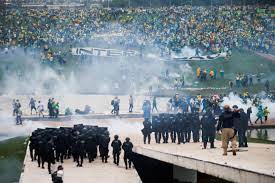A riot of losers: On the violence of Jair Bolsonaro supporters in Brazil
Bolsonaro should concede defeat and ask his supporters to stand down
Well before he was defeated by Luiz Inácio Lula da Silva in last year’s presidential elections in Brazil, Jair Bolsonaro had repeatedly said that if he failed to get re-elected, it could only be through fraud. He called his political rivals “thieves” and warned of violence if voted out. After his election defeat, he refused to concede publicly. Two days ahead of Lula’s inauguration on January 1, he left Brazil for Florida, while his supporters continued to stage camped protests outside Brasilia’s Army headquarters. Unsurprisingly, a week after Lula was inaugurated, thousands of Mr. Bolsonaro’s supporters stormed the institutional trinity of Brazil democracy — the presidential palace, the Supreme Court and Congress — saying the election was stolen and demanding that the military shut down Lula’s government. Mr. Bolsonaro has to take the blame for what happened in Brasilia on Sunday, which was reminiscent of the January 6, 2021 riots at the U.S. Capitol by Donald Trump’s supporters. While in power, he had flirted with the anti-institution, conspiracy-peddling far-right fringes of Brazilian polity. Mr. Bolsonaro, a fan of the military dictatorship, had little respect for the country’s institutions. His silence, along with support from Brazil’s wealthy classes, seems to have empowered the protesters to invade state-institutions on Sunday.
For Lula, the riots posed the first major challenge to his presidency. He said the local police, under the control of Brasilia’s Governor Ibaneis Rocha, a Bolsonaro ally, did not do enough to stop the invaders. But Lula quickly deployed federal security officials, clearing the rioters of state buildings. The Supreme Court also stepped in, ordering the military police to clear the camps of Mr. Bolsonaro’s supporters outside the military headquarters, and removed Mr. Rocha from office for three months. But that is not enough. For its own political stability, Brazil should put an end to this election-related crisis. Until now, its institutions have dealt with threats from the fringe groups with maturity. But Brazil, a relatively young democracy, has a not-so-distant violent past and its leaders should not entertain any kind of threat to its democratic stability. Brazil should get to the bottom of the riots through a thorough probe; bring all the culprits, from the instigators and the financiers to the participants, to justice; and make sure that such an incident does not occur again. Meanwhile, the least Mr. Bolsonaro could do, pending probe, is to publicly concede that he was defeated in the elections, and ask his supporters to accept this fact and respect the country’s Constitution.
